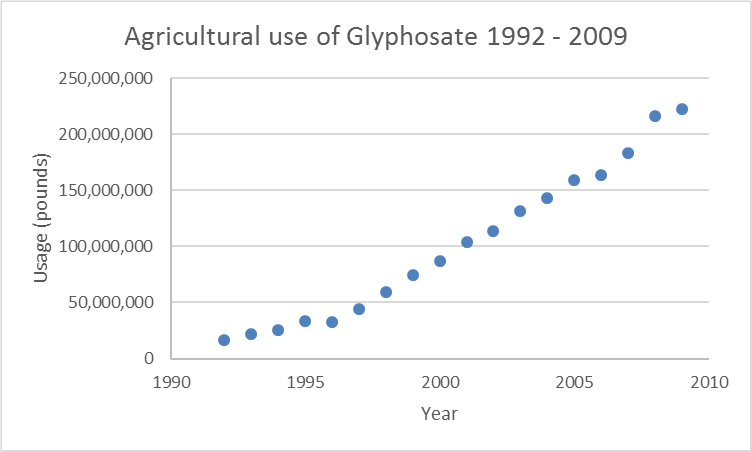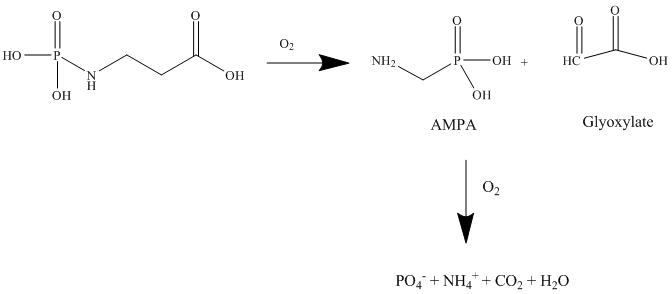Consumers Comments Requested By ATSDR Regarding Glyphosate Toxicology Contamination In Food, Water & Air Due July 8, 2019 by Catherine Frompovich for Activist Post
The Agency for Toxic Substances and Disease Registry (ATSDR) has gone out of its way, and even ‘fallen all over itself’ in trying to present a somewhat balanced 257-page report regarding the agricultural herbicide glyphosate for the purpose of soliciting consumer public comment by July 8, 2019, the due date.
Glyphosate
IUPAC name: N-(phosphonomethyl)glycine) is a broad-spectrum systemic herbicide and crop desiccant.It is an organophosphorus compound, specifically a phosphonate, which acts by inhibiting the plant enzyme 5-enolpyruvylshikimate-3-phosphate synthase.
Source: Wikipedia https://en.wikipedia.org/wiki/Glyphosate
I have read the report and made notes regarding what I think you, the reader and consumer, may be interested in addressing and commenting about since glyphosate is now omnipresent in our lives.
The ATSDR report title
Toxicological Profile for Glyphosate – April 2019
U.S. Department of Health and Human Services
Agency for Toxic Substances and Disease Registry (ATSDR)
Toxicological Profile for Glyphosate 257 pages
Draft for Public Comment PDF
https://www.atsdr.cdc.gov/toxprofiles/tp214.pdf
Public Comments
Comments may be submitted via Regulations.gov
https://www.regulations.gov/docket?D=ATSDR-2019-0001
Public Comment Period Closes on July 8, 2019 11:59 PM
The report indicates
U.S. breast milk is glyphosate free
Study is first independently verified look for the presence of Roundup ingredient in human milk
Date: July 23, 2015
Source: Washington State University
https://www.sciencedaily.com/releases/2015/07/150723133120.htm
Glyphosate is not likely to bioaccumulate in breast milk (Bus 2015) and was not detected in breast milk from lactating mothers with detectable glyphosate in their urine (McGuire et al.2016). [Pg.2]
Contrast that with “Herbicide Found In Mother’s Milk”
https://www.planetnatural.com/herbicide-mothers-milk/
A recent study[1] has found that the herbicide glyphosate, sold under the trade name Roundup (and others), is present in alarming levels in breast milk of American females. The study found that samples of mother’s milk from women in the United States contained levels of the weed-killer that were 760 to 1,600 time greater than the amount of pesticides allowed by the European Water Directive. Those levels are still less than the 700 ug/l maximum contaminant level (MCL) that the Environmental Protection Agency has decided is safe.[2]
What do 21-day rabbit studies prove? What the HHS wants to prove! Do the same dynamics apply for 28-day mice studies? Eight-day rat drinking water studies? Twenty-six month rat studies. One hundred four week Sprague-Dawley rats diet studies. How about life-long animal studies for a more accurate take on the science?
Contradictory Science
Page 95 lists contradictory science regarding the World Health Organization’s IARC’s findings ofGroup 2A (probably carcinogenic to humans) in 2017 versus the New Zealand EPA 2016 findings of “Unlikely to be genotoxic or carcinogenic to humans.”
Toxicokinetics
CHAPTER 3. TOXICOKINETICS, SUSCEPTIBLE POPULATIONS, BIOMARKERS, CHEMICAL INTERACTIONS
3.1 TOXICOKINETICS [Pg. 108]
Toxicokinetic data for glyphosate are summarized below.
- Glyphosate is readily absorbed from the gastrointestinal tract; very little glyphosate is absorbed through the skin; it is assumed that glyphosate is readily absorbed from the respiratory tract.
- Absorbed glyphosate is readily distributed via the blood, but does not accumulate in any particular organ or tissue.
- Glyphosate does not undergo significant metabolism in mammals; <1% is metabolized to AMPA.
*** [aminomethylphosphonic acid] - Approximately two-thirds of an oral dose of glyphosate is excreted in the feces as unabsorbed parent compound. Most absorbed glyphosate is rapidly excreted in the urine as parent compound.
CJF: A counterargument about AMPA
*** Fate and availability of glyphosate and AMPA in agricultural soil.
https://www.ncbi.nlm.nih.gov/pubmed/18576216
This indicates that the risk of leaching of aged glyphosate and AMPA residues from soil is greater in fertilized soil. The blank soil, to which 252 g glyphosate/ha was applied 21 months before this study, contained 0.81 ng glyphosate/g dry soil and 10.46 ng AMPA/g dry soil at the start of the study. Blank soil samples were used as controls without glyphosate addition. After incubation of the blank soil samples for 6 months, a significantly larger amount of AMPA was extracted from the soil treated with phosphate solution than from that treated with pure water. To determine the degree of uptake of aged glyphosate residues by crops growing in the soil, (14)C-labeled glyphosate was applied to soil 6.5 months prior to sowing rape and barley seeds.
Also see https://www.sciencedirect.com/science/article/pii/S0048969717327973
Distribution of glyphosate and aminomethylphosphonic acid (AMPA) in agricultural topsoils of the European Union [2017]
Animal to Human Extrapolations
3.1.6 Animal-to-Human Extrapolations [Page 112]
No information was located to suggest significant differences between animals and humans regarding the toxicokinetics of glyphosate.
The above must be challenged since there seems to be conflicting science.
3.2 CHILDREN AND OTHER POPULATIONS THAT ARE UNUSUALLY SUSCEPTIBLE [Page 116]
A must read for everyone, especially parents who use Roundup® and other glyphosate-containing herbicides.
Interactions with Other Chemicals
3.4 INTERACTIONS WITH OTHER CHEMICALS [Page 118]
Surfactants such as POEA in glyphosate-containing products might enhance the toxicity of glyphosate; results from one study indicate that the surfactant may be more acutely toxic than glyphosate or the combination of glyphosate and POEA (e.g., Adam et al. 1997).
Astronomical Increases in Glyphosate Agricultural Uses
Page 128
Increase Use on These Crops
Pages 128 & 129 show the percent of increase in glyphosate use on crops from 1990 to 2014.
Some increases are:
- Cotton 8,953.62 % (percent)
- Corn 7,734.58 %
- Sugar Beets 7,547.59 %
- Soybeans 5,599.10 %
- Wheat winter 3,623.64 %
- Alfalfa 2,220.58 %
- Sorghum 1,668.30 %
- Spring wheat 1,495.86 %
- Barley 708.83 %
- Other Crops 138.52 %
Source: Benbrook 2016
Consumer Disposal Protocol
Pg. 129 5.2.4 Disposal
Containers that have not been completely rinsed may be considered hazardous and should be disposed of with regard to federal, state, and local regulations. Any unused product may be recycled by applying the product in an approved use setting or returning it to the manufacturer or supplier for safe disposal (Agrisolutions 2010; EPA 1993, 2011).
[Who are they kidding? Consumers must exercise proper disposal, but EPA does not require glyphosate waste water from manufacturing and processing facilities to be reported!]
Water Contamination Information Not Required
Pg. 131 5.3.2 Water
There is no information on releases of glyphosate to water from manufacturing and processing facilities because these releases are not required to be reported
(EPA 2005b).
[How outrageous! So what, then, is the accurate status of glyphosate contamination in ground water and acquifers?]
Plant Roots Absorption of Glyphosate
Absorption of glyphosate by plant roots is discussed on Page 135 Other Media
Glyphosate can be absorbed into the plant or vegetable through its outer wall or skin and can move throughout the stem and leaves of the entire plant. Metabolism of glyphosate within the plant occurs slowly (Doublet et al. 2009; Smith and Oehme 1992; WHO 2005). Glyphosate is mobile inside the plant and may be transported within the phloem system [plants transport system] into other tissues before the plant is killed (Duke and Powles 2008; Pankey 2000; Plimmer et al. 2004).
[Are you eating glyphosate with every bite of crops genetically modified to ‘tolerate’ glyphosate?]
Degradation of Glyphosate under Aerobic [O2] Conditions
Pg. 136 Figure 5-2. Degradation of Glyphosate under Aerobic [free oxygen] Conditions
Note: the “daughters” of AMPA breakdown in the chart below
As a sidebar, please see Microbial degradation of herbicides [Aug. 2014]
Glyphosate Not Included in FDA’s Pesticide Residue Monitoring Program
Page 152:
Glyphosate was not included in compounds tested for by the Food and Drug Administration’s (FDA) Pesticide Residue Monitoring Program (PRMP), nor in the United States Department of Agriculture’s Pesticide Data Program (PDP) (FDA 2015; NPIC 2015).
How “Jim-dandy”: on Pg. 157, we read this extremely candid remark:
The Fourth National Report on Human Exposures to Environmental Chemicals, published and updated by the Centers for Disease Control and Prevention reporting biomonitoring data from the National Health and Nutrition Examination Survey (NHANES), does not include data for glyphosate or its metabolite, AMPA (CDC 2018).
[How convenient, and why is that data not included?]
So why have the statements on pp. 152 and 157 above been made within the report IF ATSDR was not trying to present a semblance of transparency?
Health Effects Studies on Glyphosate Formulations
Check Pg. 161 for Figure 6-2. Summary of Existing Health Effects Studies on Glyphosate Formulations (Listed by Endpoint)*
Potential cancer, respiratory, and developmental effects were the most studied in humans; potential body weight and developmental effects were the most studied in animals.
For humans, the most studied were cancer 20; cardiovascular 10; gastrointestinal and respiratory 8 each;
Excellent Glossary of Science Terms
Appendix E is an excellent Glossary of science terms referring to Glyphosate issues. See pp.E1 to E6.
My Conclusion
The ATSDR report for public comment, I think, needs to be challenged for accuracy even though those who drafted it tried to indicate, and incorporated, certain scientific myths and studies as glyphosate being safe and you can ‘drink it’, as one Monsanto lobbyist offered.
Lobbyist Claims Monsanto’s Roundup Is Safe To Drink, But Refuses It
0:45 minutes
However, I can assure you consumers worldwide are eating and drinking glyphosate more than they even know. If you experience gut problems, take notice.
Please make your comments known by July 8, 2019 at
Regulations.gov
https://www.regulations.gov/docket?
Public Comment Period Closes at 11:59 PM
Notes:
[1] https://sustainablepulse.com/2014/04/06/worlds-number-1-herbicide-discovered-u-s-mothers-breast-milk/#.XLJChjBKiUl
[2] https://www.planetnatural.com/herbicide-mothers-milk/
Resource:
Major Pesticides Are More Toxic to Human Cells Than Their Declared Active Principles
https://www.ncbi.nlm.nih.gov/
“Despite its relatively benign reputation, Roundup was among the most toxic herbicides and insecticides tested.”
Catherine J Frompovich (website) is a retired natural nutritionist who earned advanced degrees in Nutrition and Holistic Health Sciences, Certification in Orthomolecular Theory and Practice plus Paralegal Studies.Her work has been published in national and airline magazines since the early 1980s. Catherine authored numerous books on health issues along with co-authoring papers and monographs with physicians, nurses, and holistic healthcare professionals. She has been a consumer healthcare researcher 35 years and counting.
Catherine’s latest book, published October 4, 2013, is Vaccination Voodoo, What YOU Don’t Know About Vaccines, available on Amazon.com.
Her 2012 book A Cancer Answer, Holistic BREAST Cancer Management, A Guide to Effective & Non-Toxic Treatments, is available on Amazon.com and as a Kindle eBook.
Two of Catherine’s more recent books on Amazon.com are Our Chemical Lives And The Hijacking Of Our DNA, A Probe Into What’s Probably Making Us Sick (2009) and Lord, How Can I Make It Through Grieving My Loss, An Inspirational Guide Through the Grieving Process (2008)
Catherine’s NEW book: Eat To Beat Disease, Foods Medicinal Qualities
©2016 Catherine J Frompovich is now available






